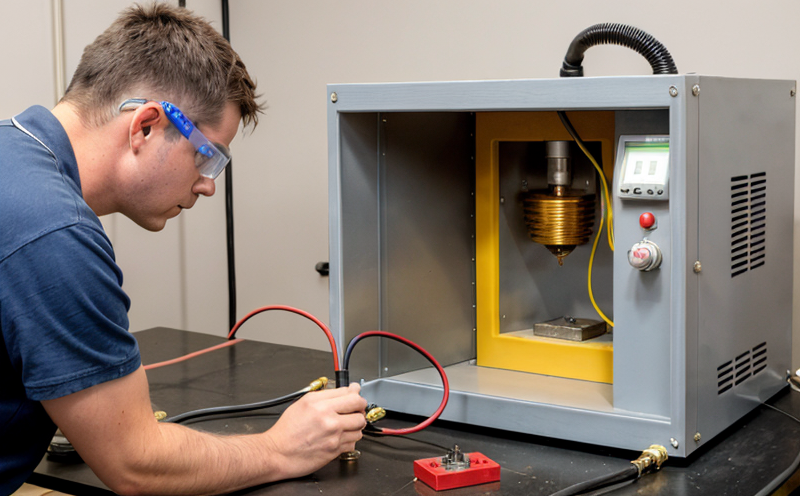ISO 60404-4 DC Magnetic Testing of Steels
The ISO 60404 series provides a comprehensive framework for assessing the electrical and magnetic properties of metallic materials, with Part 4: Determination of Direct Current (DC) Permeability specifically addressing the direct current permeability measurement of steels. This test is crucial in quality control processes to ensure that steel products meet stringent performance criteria required by various industries.
The application of DC magnetic testing for steels involves subjecting a specimen to a steady electric current and measuring how it influences the magnetic properties. The test is particularly useful in identifying internal defects such as cracks, voids, and other anomalies within the material structure. This non-destructive testing method offers several advantages: it can be performed on-site, requires minimal sample preparation, and provides immediate feedback about the integrity of the steel.
The process begins with proper specimen preparation to ensure accurate measurement results. The specimen is typically cleaned and degaussed before being placed in a magnetic field generated by the tester equipment. The direct current permeability (DCμ) is then measured by observing how the applied current alters the magnetic properties of the material. This measurement can help identify variations in the steel’s magnetic properties, which could indicate inherent defects or changes in composition.
The ISO 60404-4 standard specifies detailed procedures and criteria for conducting this test accurately. These include setting up the equipment, calibrating it according to specified standards like ASTM E581 or EN 443, and ensuring that the specimen is correctly aligned within the magnetic field. The results are analyzed using specific formulas derived from these international standards.
Understanding the implications of DC permeability measurements in steel production and quality assurance is essential for industries relying heavily on structural integrity. For instance, aerospace manufacturers use this test to ensure critical components perform reliably under extreme conditions. Automotive companies also apply it during development stages to enhance product durability and safety features. In construction sectors, accurate magnetic property data helps architects and engineers select appropriate materials for high-stress applications.
By adhering strictly to ISO 60404-4 guidelines, laboratories can provide reliable assessments that contribute significantly towards maintaining industry standards. This ensures not only compliance with regulatory requirements but also enhances customer confidence in the quality of steel products supplied by manufacturers across different sectors.
- Aerospace
- Automotive
- Construction
- Machinery
- Electrical Engineering
- Shipbuilding
- Oil & Gas
- Renewable Energy
This testing method plays a pivotal role in maintaining consistency and reliability across diverse industrial applications where the integrity of steel components is paramount.
Industry Applications
- Aerospace: Ensuring structural integrity of aircraft parts
- Automotive: Enhancing product durability and safety features
- Construction: Selecting appropriate materials for high-stress applications
- Machinery: Guaranteeing operational reliability in manufacturing equipment
- Electrical Engineering: Improving efficiency in power transmission systems
- Shipbuilding: Verifying hull strength during design and maintenance phases
- Oil & Gas: Assessing pipeline integrity for long-term service life
- Renewable Energy: Evaluating turbine blades' performance under varying conditions
The ISO 60404-4 DC Magnetic Testing of Steels is widely used in these industries to ensure the highest levels of quality and safety. By adhering strictly to this standard, manufacturers can provide products that meet regulatory requirements while also enhancing customer confidence.
Why Choose This Test
The ISO 60404-4 DC Magnetic Testing of Steels offers numerous advantages over other testing methods when evaluating the electrical and magnetic properties of steels. Firstly, it is a non-destructive technique that allows for repeated inspections without damaging the sample, making it ideal for quality control processes in production environments.
Secondly, this test provides precise measurements of direct current permeability (DCμ), which are critical indicators of internal defects within the steel. Accurate DCμ values help manufacturers identify potential issues early on, allowing them to address these concerns before proceeding with further processing or assembly stages. This proactive approach reduces waste and minimizes costly rework.
Thirdly, the ISO 60404-4 standard ensures consistency across laboratories by providing clear instructions for conducting the test. Laboratories following this protocol can generate repeatable results that are comparable to those produced by other reputable institutions worldwide. Such consistency builds trust among clients and stakeholders, particularly in international markets where conformity to global standards is essential.
Lastly, incorporating ISO 60404-4 into your quality assurance program demonstrates a commitment to excellence and reliability. It positions you as an industry leader who prioritizes product integrity above all else. This commitment not only enhances your reputation but also fosters long-term relationships with customers who value high-quality steel products.
By choosing ISO 60404-4 DC Magnetic Testing, you invest in a robust testing methodology that supports sustainable business practices and contributes to the overall safety and performance of steel-based products across various sectors.
International Acceptance and Recognition
The ISO 60404 series has gained widespread recognition from industries globally due to its rigorous methodology and consistent results. Being part of the International Organization for Standardization (ISO), these standards are widely accepted across borders, ensuring compatibility between different testing facilities worldwide.
Many leading organizations in aerospace, automotive, construction, machinery, electrical engineering, shipbuilding, oil & gas, and renewable energy sectors rely on ISO 60404-4 to assess the magnetic properties of steels. Compliance with these standards not only ensures adherence to international regulations but also enhances credibility among clients and partners.
The acceptance of ISO 60404-4 extends beyond mere compliance; it represents a commitment to excellence in quality assurance. By embracing this standard, laboratories contribute significantly to the global effort towards maintaining high standards of safety and performance across diverse steel-based applications.





